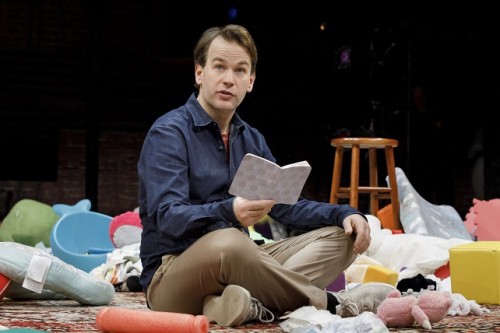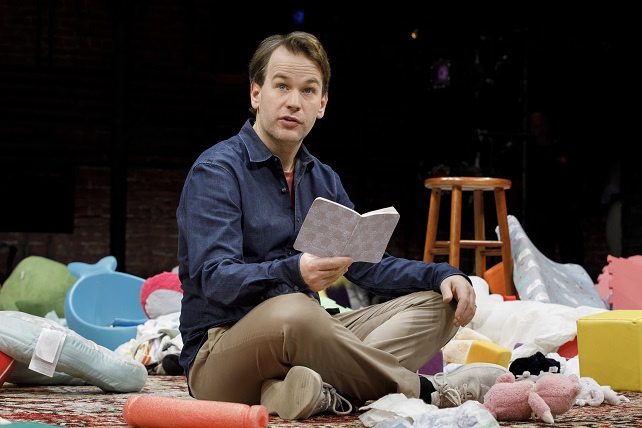 United States Mike Birbiglia’s The New One: Cort Theatre, New York. 19.11.2018. (CSa)
United States Mike Birbiglia’s The New One: Cort Theatre, New York. 19.11.2018. (CSa)

Production:
Written and Performed by Mike Birbiglia
Additional Writing – Jennifer Hope Sein
Director – Seth Barrish
Scenic Design – Beowolf Boritt
Lighting design – Aaron Copp
Sound design – Leon Rothenberg
Mike Birbiglia describes himself as a funny Matt Damon, which is true on both counts. Although a little pudgier than his Hollywood counterpart, he bears an uncanny resemblance to Damon. He is also very very funny. Birbiglia, a self-styled comedian, storyteller, director and actor, is the husband of poet Julia Hope Stein, a.k.a. ‘Jen’, and father to a newly born baby girl. In his hilarious and unflinchingly truthful one-man show The New One, he draws on the joys and tribulations of marriage, child birth and early parenthood.
New baby Oona, the eponymous but unseen ‘new one’, is undoubtedly the off-stage star of the 80-minute show, but it’s the living room sofa – a recurring image in Birbiglia’s subversive yet tender narrative -which is the physical and self-psychoanalytical epicentre of his domestic universe. ‘I want to tell you a story, but first I want to tell you about my couch. I love my couch’, Birbiglia confesses. ‘It’s the first thing I ever dropped money on in my life. My wife and I … have spent thousands of hours on this couch. We’ve watched classic films on this couch. We’ve eaten twenty birthday cakes on this couch. We’ve cried in each other arms when we had to put our cat Ivan to sleep on this couch. It’s soft yet firm. Filthy yet spotless, colourful, yet no one can agree on what colour it is. I think it’s green. My wife thinks it’s grey. I looked it up. Chocolate.’
For the next 80 minutes, as if on a therapist’s couch, Birbiglia circles and weaves around a bare stage, chronicling the impact on his life of the arrival of ‘baby’ – her sudden dominance given added emphasis by the omission of the indefinite article. The resulting power shift within the family leads to feelings of impotence and isolation. Claims Birbiglia, ‘I didn’t know what “nothing” meant until I became a dad, and I was like, ‘Oh, that’s what “nothing” is. You’re this pudgy, milk-less Vice President of the family. Huge title, no power … You’re the one whose job it is to be around and have no opinion.’
Like Woody Allen and others before him, Birbiglia taps into familiar stand-up territory – the humour of nervous anxiety, physical illness and sexual ineptitude – but he does so with startling intimacy and disarming originality. He enumerates a list of ailments, from the discovery of a bladder tumour at the tender age of 19, and the resulting cystoscopy (a squirm-inducing journey with a camera on the end of a stick through his urethra), to a life-threatening sleep-walking disorder which requires him to sleep in a pod, wearing mittens so he can’t open the zip. A naïve student trip to the red light district in Amsterdam with ‘a friend of a friend’, which Birbiglia defines as ‘someone you murder people with or buy a steak knife from,’ ends in a bumbling encounter with a prostitute, and a reminder that an inadequate seventh-grade health class in his Massachusetts high school involving a banana and a condom had left him ill prepared.
The use of intimate material, particularly the sexually explicit anecdote, are now familiar tropes in comic routines, designed simply to shock, and often crude and gratuitous. But this is a play, not a ‘routine’, and in the hands of a skilful raconteur they are endearingly gentle confessions of inadequacy.
It is this quality of poetic vulnerability which is key to Birbiglia’s brand of humour. With hilarity tempered by humanity, he describes from a prospective father’s point of view the sense of alienation at birthing classes, and the fear and anti-climax at the actual moment of Oona’s birth – ‘a colossal event in which a human being enters the earth, my wife becomes a mother, and I … pretty much stay the same’. The novel obligations of ‘shared’ parenthood are chronicled with gentle but familiar exasperation. The unwelcome discovery, on returning from an exhausting professional engagement in Weatherford, Oklahoma, that Oona and Mum have usurped the sacred couch, leads to a particularly brilliant riff. ‘We like to sleep on the couch’ declares Jen. ‘Who is in “We”?’, Birbiglia asks, informing us that he is a founding member of ‘We’. He is crestfallen when Jen replies, ‘We is Me and Oona.’
‘We’ of course also includes the audience – a packed house of one-night psychoanalysts in a consulting room auditorium, listening intently to Birbiglia’s couch confessions. We laugh appreciatively, but significantly, it is once baby Oona learns to laugh that her Dad begins to ‘see the world through baby’s eyes’.
Chris Sallon
For more about The New One click here.
